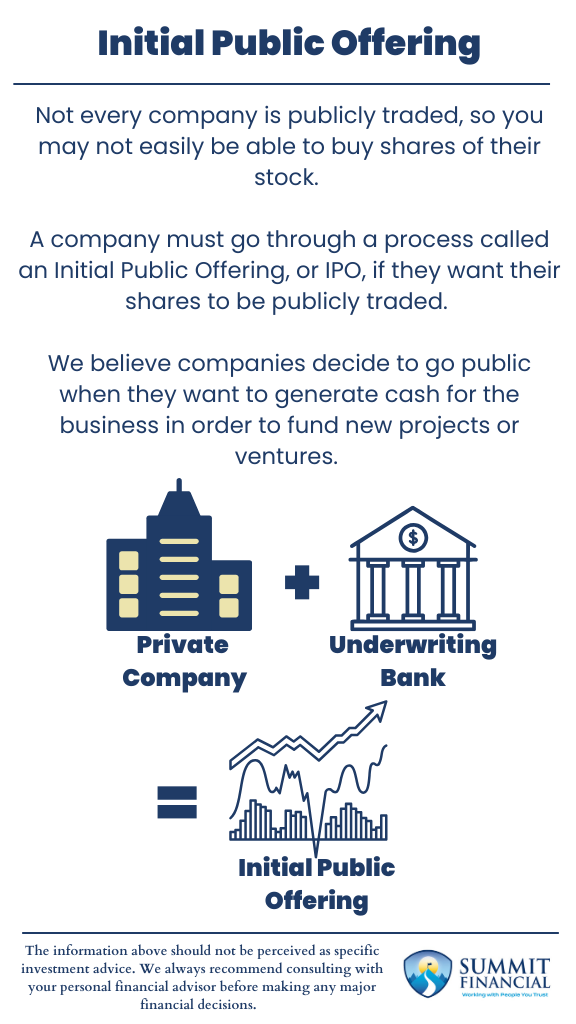- Not every company is publicly traded, so you may not easily be able to buy shares of their stock.
- A company must go through a process called an Initial Public Offering, or IPO, if they want their shares to be publicly traded.
- We believe companies decide to go public when they want to generate cash for the business to fund new projects or ventures.
How Public Companies Differ from Private Companies
Oftentimes, investors decide to purchase shares of stock of specific companies or corporations. If the shares are listed on a stock exchange and can be easily purchased, then the company is publicly traded.
This means that anyone with an investment account and the required funds can place a trade to buy a share of that company’s stock. However, most companies start as a private venture when they are first established and do not go public until later on.
Even now, there are some large corporations that are still privately owned, so going public is not a requirement for a company to be successful
The IPO Process and Regulatory Compliance
In order to offer publicly traded shares, the company must go through a process called an Initial Public Offering, or IPO.
There are a handful of additional requirements and regulations that must be complied with once going public, so this is not a decision that companies take lightly.
The decision to go public will involve the sale of the company’s stock, generating cash to fund new projects or ventures. If a company believes they are large enough to handle the regulations, attractive enough for investors to want to purchase, and in need of liquid cash, then it may decide to pursue an IPO.

The Role of Underwriters in an IPO
The IPO process will begin with the company reaching out to a bank to perform underwriting. This will involve a deep dive into the company financials in order to ensure they are strong enough to be sold to the public.
This analysis will also be used to help determine the number of shares to be offered and the initial share price. The underwriters will also help draft legal documents that are needed to meet federal regulations for the initial offering and ongoing trading.
We believe this process can be an expensive one, which is another reason why this decision should not be made lightly. But once the stocks are public, the company may be able to see the benefit and possibly generate the desired cash for the corporation and existing shareholders.
Private Investment Opportunities and Angel Investing
It is easier to invest in a public company, but it is not impossible to find private opportunities as well. Generally, startups are always looking for investors to help fund their initial efforts, although the risk with these investments is normally much higher due to the future of the company being uncertain.
This process is known as Angel Investing due to the investors being held in such high regard in the eyes of the company. Other private investment opportunities may exist, but they typically require the right connections to arrange the conversations and also a large sum of cash to entice the company to accept the offer.
Private companies are more challenging to value since they have not undergone extensive underwriting, so agreeing on a share or purchase price typically involves considerable negotiation.
Speak With a Trusted Advisor
If you have any questions about your investment portfolio, retirement planning, tax strategies, our 401(k) recommendation service, or other general inquiries, please contact our office at (586) 226-2100. Please feel free to forward this commentary to a friend, family member, or co-worker. If you have experienced any changes to your income, job, family, health insurance, risk tolerance, or overall financial situation, please call us so we can discuss them.
We hope you learned something today. If you have any feedback or suggestions, we would appreciate hearing from you.
Best Regards,
Zachary A. Bachner, CFP®
with contributions from Robert Wink, Kenneth Wink, and James Wink.
If you found this article helpful, consider reading:
- Navigating College Funding
- Financial Planning Mistakes to Avoid
- Debt Repayment Strategies
- How to Negotiate a Raise
Sources:
- https://www.investopedia.com/terms/i/ipo.asp
- https://www.forbes.com/advisor/investing/initial-public-offering-ipo/
- https://www.fool.com/investing/stock-market/types-of-stocks/ipo-stocks/what-is-an-ipo/
- https://www.nerdwallet.com/article/investing/angel-investing
- https://www.investopedia.com/terms/p/publiccompany.asp
- https://www.investopedia.com/terms/a/angelinvestor.asp


